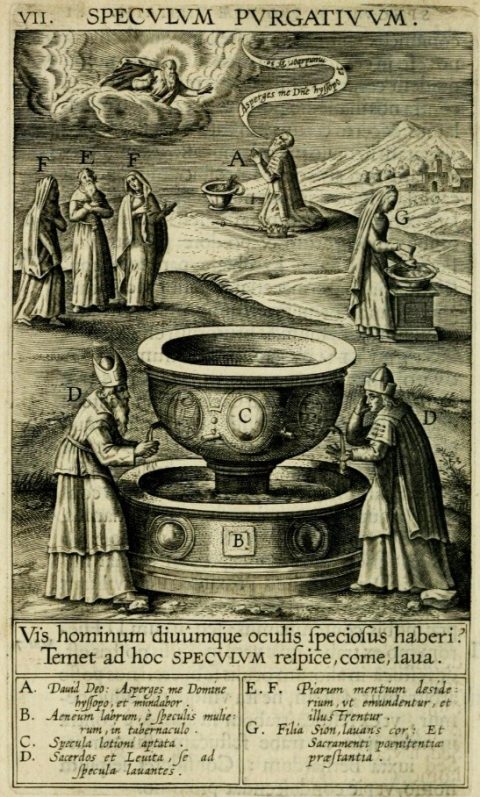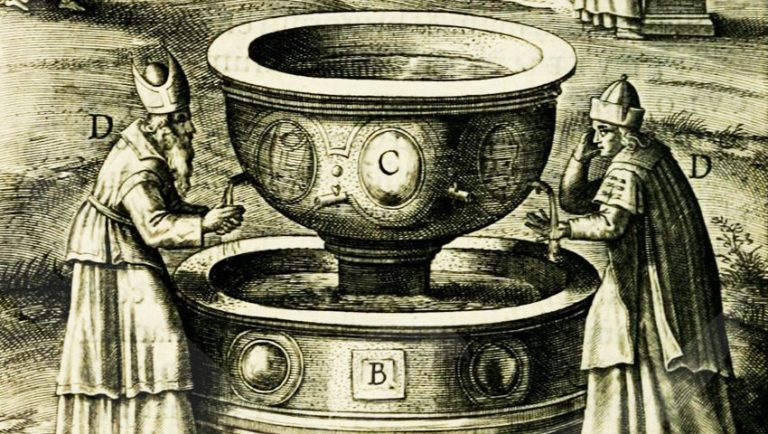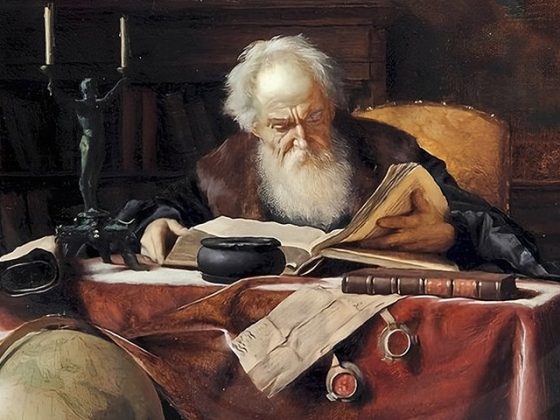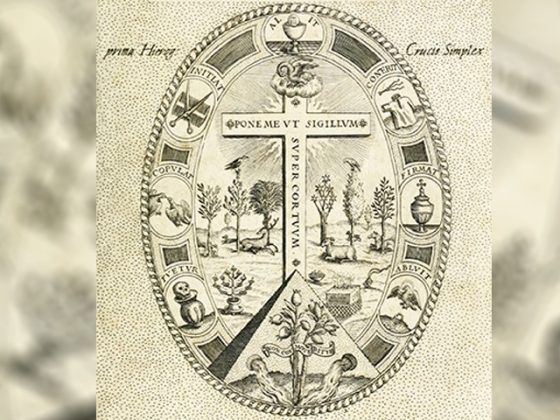Dearest friends:
It is with great pleasure that I send you all this engraving entitled…
…SPECVLVM PVRGATIVM
─‘Mirror of Purification’─

Dear readers, this engraving leads us to question our degrees of purity or purification during our journey through the three-dimensional world.
To get into the explanation of it, let us go directly to the sentence that is written in Latin right at the foot of that large chalice or cup that stands as the central figure of it. The sentence tells us:
«Vis Hominum diuumque oculis speciosus haberi? Temet ad hoc SPECVLUM respice, come, laua».
Translation: ‘Do you want to be beautiful in the eyes of men and the Gods? Look at yourself in this mirror, groom yourself, wash yourself.'
Undoubtedly, companions of the path, we need to wash ourselves of our impurities, as our doctrine teaches us so well. Our washing involves not only the washing of our earthly body, but also the washing of our animic garments, as commanded by the very Leviticus of the Holy Scriptures.
Obviously, the fact that on both sides of that great chalice there is both a priest and a Levite, who are shown washing their hands with the water that flows from the same enormous cup, reminds us immediately of the Grail or Gomor, which contains the Genesiac waters capable of erasing from our nature the original sin or fornication, in which the human race was immersed after the angelic fall treated in all the sacred texts that have been handed over to the rational homunculus. In other words, we are commanded to wash in the waters of renunciation, which we can only manipulate with the sacred science of Alchemy or ars transmutatorium, also called Arcanum A.Z.F.
Continuing our description, we now find ourselves before the figure of a king whose scepter of power and crown are by his side while he is praying to the Lord, who appears in the CLOUDS. It is King David, who is crying out to God: “Asperges me Domine hyssopo et mundabor.” Translation: ‘Purify me with hyssop and I will be clean' ─Psalm 51, which is also called Have mercy, Lord, Miserere─. It is said to have been written by King David, who asked God for forgiveness after he had seduced Bathsheba, the wife of one of his officials. This is marked with the letter A.
Next, marked with the letter B, we can see the base of the large chalice as a round recipient where the waters accumulate. This base again alludes to the female yoni, as does the aforementioned chalice. This is accompanied by a Latin phrase that reads as follows:
«Aeneum labrum, e specvlis mulierum, in tabernacvlo».
Translation: ‘Large copper vessel, of the mirrors of women, in the tabernacle.' Exodus 38:8 is referenced: “And he made the laver of bronze and its base of bronze, from the bronze mirrors of the serving women who assembled at the door of the tabernacle of meeting.” The biblical passage about the construction of the tabernacle, Exodus 36:8 to 38:20.
Close to the letter C, we find the enormous chalice that we have commented on in previous lines. But on this occasion the figure is accompanied by this Latin phrase:
"Specvla lotioni aptata".
Translation: ‘Mirrors placed on the copper vessel'. These mirrors refer to the reiterations of our alchemical practices.
Marked with the letter D we see a priest and a Levite, both washing their hands with the water that flows from the huge cup. Everything is accompanied by this Latin phrase:
"Sacerdote et leuita, se ad specvla lauantes".
Translation: ‘The priest and the Levite washing themselves in the mirror', an ordinance of the sacred texts for all those who would belong to the lineage of David, in other words, to the lineage of the purified.
Later, accompanied by the letters E and F, we see some people who, concerned about their inner state, are encompassed in the following Latin phrase:
«E. F. Piarum mentium desiderium, vt emundentur, et illustrentur».
Translation: ‘The desire of pious minds is that they should be purified and enlightened.' Obviously, those who have a real desire to change their nature only persistently yearn to be an enlightened or purified creature one day.
Finally, marked with the letter G, we observe a young woman named Daughter of Zion washing her heart, and all this accompanied by the Latin phrase:
«Filia Sion, lauans cor: Et Sacramenti poenitentiae proestantia».
Translation: ‘Daughter of Zion, washing the heart: and offering the sacrament of penance.' It may refer to Jeremiah 4:14: “O Jerusalem, wash your heart from wickedness, that you may be saved.
How long shall your evil thoughts lodge within you?
This reminds us that if we truly want to be part of the heavenly Jerusalem, we must cleanse our minds, our hearts, our words, and our actions of all egoic filth.
I give you now, patient readers, some sentences that fortunately come to us, so as to be reflected upon:
“Long reflection is a guarantee of good success.”
Charles I of Spain
“One part of men acts without thinking, the other thinks without acting.”
Ugo Foscolo
“Reflection in proceeding is a great advantage in acting.”
Gracián
“Never ask the one with a smooth forehead, because it is a sign that he does not reflect.”
Pythagoras
“He who prays the most is not more just, nor is the one who most frequents the temple more believing; to love much and to forgive one's fellow men is the saving science of the simple and humble soul.”
Massillon
SURSUM CORDA.
─'Lift up your heart'─.
KWEN KHAN KHU





